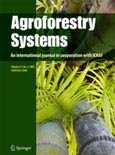Eucalyptus has emerged as a game-changer in Bangladesh’s forestry sector due to its high productivity in dry and infertile areas. To understand farmers’ preference for eucalyptus despite government bans, comprehensive surveys and on-farm experiments were conducted in Dinajpur, Bangladesh. Additionally, Bangabandhu Sheikh Mujibur Rahman Agricultural University (BSMRAU) conducted small-scale field and pot experiments to evaluate the allelopathic impacts of eucalyptus roots, bark, and leaf extracts on rice yield during the Boro and Aus seasons. Our survey revealed that, despite challenges like water competition, leaf contamination, hindered tillage, and reduced soil fertility, farmers successfully grow rice, maize, potato, tomato, mustard, and grass alongside eucalyptus trees. Farmers are motivated by eucalyptus’s potential to enhance economic returns, evidenced by a high benefit–cost ratio of 1.22‒1.81 and a 10-year net compensation of US$5552–9918, even after yield losses. Our Dinajpur field experiment showed that rice yield was relatively unaffected at 5 m from the tree base, but closer distances reduced yield by 56.77 and 42.10% in Boro and Aus seasons, respectively, compared with sole rice systems. Field and pot experiments at BSMRAU showed a severe decline in rice yields with increasing tree leaf coverage and eucalyptus extract concentrations (0 to 100% concentration), likely due to allelochemicals. Surprisingly, areas near the eucalyptus base showed enhanced total nitrogen and organic carbon levels, credited to substantial leaf litter deposition. Our research decisively proves that eucalyptus and eucalyptus-based agroforestry systems boost farmers' socio-economic status by offering valuable forest resources and debunking harmful misconceptions.
DOI:
https://doi.org/10.1007/s10457-024-01077-5
Altmetric score:
Dimensions Citation Count:
























